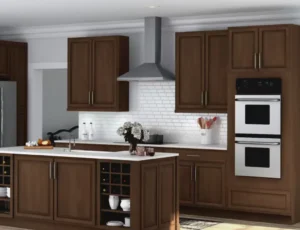In today’s world, where clean drinking water is essential for health and well-being, the quality of water coming from your kitchen faucet is more important than ever. With concerns about contaminants and pollutants, investing in a reliable kitchen water filter can make a significant difference. But with so many options available, how do you choose the right one? This guide will explore the top kitchen water filters and provide insights into home water purification systems, reverse osmosis systems, and more to help you make an informed decision.
Table of Contents
In today’s world, where clean drinking water is essential for health and well-being, the quality of water coming from your kitchen faucet is more important than ever. With concerns about contaminants and pollutants, investing in a reliable kitchen water filter can make a significant difference. But with so many options available, how do you choose the right one? This guide will explore the top kitchen water filters and provide insights into home water purification systems, reverse osmosis systems, and more to help you make an informed decision.
Why Invest in a Kitchen Water Filter?
The Importance of Clean Drinking Water
The quality of your drinking water directly affects your health. Contaminants such as chlorine, lead, and bacteria can find their way into your water supply, posing risks to your well-being. A home water filtration system helps eliminate these contaminants, providing you with pure and safe drinking water right from your kitchen faucet.
Health Benefits:
• Reduces exposure to harmful contaminants.
• Enhances the taste and smell of water.
• Ensures a cleaner and safer drinking experience.
Types of Kitchen Water Filters
When choosing a kitchen water filter, it’s essential to understand the different types available and how they work. Here’s a look at some popular options:
1. Activated Carbon Filters
Activated carbon filters are one of the most common types of kitchen water filters. They work by adsorbing impurities onto the surface of the carbon, effectively removing contaminants such as chlorine, sediment, and volatile organic compounds (VOCs).
Pros:
• Effective at improving taste and odor.
• Easy to install and maintain.
• Cost-effective.
Cons:
• May not remove all contaminants, such as heavy metals.
• Requires regular filter replacements.
2. Reverse Osmosis Systems
Reverse osmosis systems are known for their advanced filtration capabilities. These systems use a semi-permeable membrane to remove up to 99% of contaminants, including heavy metals, nitrates, and bacteria.
Pros:
• Highly effective at purifying water.
• Removes a wide range of contaminants.
• Provides high-quality drinking water.
Cons:
• Higher initial cost.
• May waste some water during the filtration process.
• Requires professional installation.
3. Ultrafiltration Systems
Ultrafiltration systems use a membrane to filter out contaminants as small as 0.01 microns. They are effective at removing bacteria, viruses, and larger particles, offering a high level of purification.
Pros:
• Provides excellent filtration.
• Retains essential minerals in water.
• Typically has a higher flow rate compared to reverse osmosis systems.
Cons:
• Can be more expensive.
• May not remove certain dissolved contaminants.
How to Choose the Right Kitchen Water Filter
Selecting the right water purification system for your kitchen involves considering various factors. Here are some tips to help you choose the best option for your needs:
1. Assess Your Water Quality
Before choosing a home water filtration system, it’s crucial to test your water for specific contaminants. This will help you select a filter that effectively addresses your water quality issues.
Steps:
• Use a water testing kit or hire a professional to analyze your water.
• Identify contaminants and their concentrations.
• Choose a filter that targets the identified contaminants.
2. Consider Filter Capacity and Flow Rate
Different filters have varying capacities and flow rates. Make sure to select a system that meets your household’s needs without compromising performance.
Factors:
• Daily water consumption.
• Filter lifespan and replacement frequency.
• Water flow rate and pressure.
3. Evaluate Maintenance and Cost
The long-term costs and maintenance requirements of your chosen filter are essential considerations. Some filters require frequent replacements, while others have a more extended lifespan.
Considerations:
• Initial cost and installation fees.
• Ongoing maintenance and filter replacement costs.
• Availability of replacement filters.
4. Look for Certifications
Opt for water filters that are certified by reputable organizations, such as NSF International, to ensure their effectiveness and safety.
Certifications:
• NSF/ANSI Standard 42 (for taste and odor reduction).
• NSF/ANSI Standard 53 (for contaminant reduction).
• NSF/ANSI Standard 58 (for reverse osmosis systems).
The Benefits of a Home Water Purification System
Investing in a home water purification system offers numerous advantages beyond just improving the taste of your drinking water. Here’s how a quality system can enhance your home:
• Healthier Water: Removes harmful contaminants, reducing the risk of waterborne illnesses and improving overall health.
• Cost Savings: Reduces the need for bottled water, saving money and reducing plastic waste.
• Convenience: Provides easy access to purified water right from your kitchen faucet, eliminating the need for additional water bottles or pitchers.
Conclusion
Choosing the right kitchen water filter is a crucial step in ensuring that you and your family have access to pure, safe drinking water. Whether you opt for a reverse osmosis system, an activated carbon filter, or another home water filtration system, understanding your water quality, filter options, and maintenance requirements will help you make the best decision.
By investing in a high-quality kitchen water filter, you’re not only improving the taste and safety of your drinking water but also enhancing the overall health and well-being of your household. Take the time to evaluate your options and choose a system that meets your needs, ensuring that every glass of water you drink is as clean and refreshing as possible.




More Stories
Great Expectations Floor Restoration Boise: Bringing Your Hardwood Floors Back to Life
On-Site Public Insurance Claims Adjuster Los Angeles: Why Local Expertise Makes All the Difference
Renovate Builders Remodeling Seattle: Transforming Homes with Expert Craftsmanship